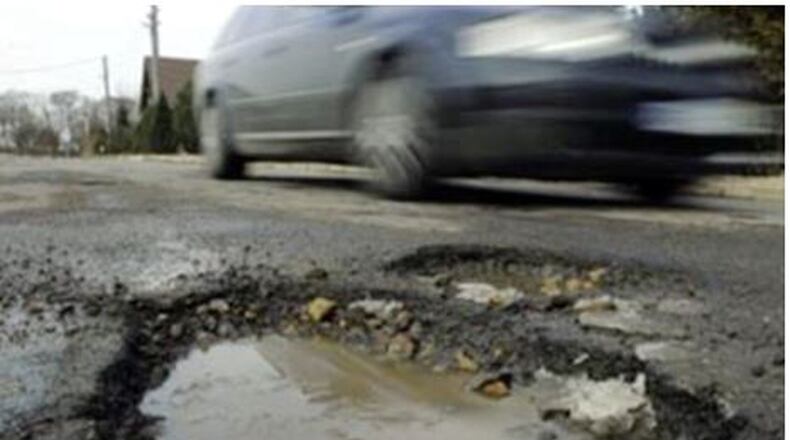“The main thing we want to do is educate people, get people so that they’re informed voters,” said Jack Whalen, head of the citizen-led campaign effort. “If they vote no, so be it, but we want them to be informed and have the facts.”
“There’s a lot of misinformation out there that’s not factual.”
City government cannot participate in the campaign or fund it, so residents are being the advocates and donating funds for campaign materials.
“I think if people know the facts, they’ll vote yes,” Whalen added.
Some people think Hamilton city government has enough money already to repair the streets, Whalen added.
“But the answer is no,” he said. “The definitive answer simply is no — they do not have the money. And it’s public record. You can go look at the budget.”
Because of massive job losses Hamilton suffered during the Great Recession that started in 2008, and accompanying losses of tax revenues, city government’s general-fund budget is about the same size as it was a decade ago, with dozens of fewer employees.
Difficulties fixing streets “is not a Hamilton-only problem,” Whalen said. “You can go to Lima, you can go to Middletown, you can go to Trenton, you can go wherever you want,” and governments have the same difficulties.
Ohio has had trouble fixing highways, as well. Early in 2019, Gov. Mike DeWine asked the Ohio General Assembly for an 18-cent-per-gallon boost in the state’s gasoline tax, saying even that amount would not be enough to adequately fix highways. Lawmakers reduced that amount to 10.5 cents per gallon of gas and 19 cents per gallon of diesel fuel.
Related: ODOT Director says Ohio must find money to fix roads or ‘more people will get hurt’
After the state implemented that increase, Hamilton City Council reduced the amount of its proposed tax levy by the amount it expected to receive from its share of the state’s gas-tax increase.
Some 50 percent of Hamilton streets are categorized as poor by a company that evaluated them, with another 20 percent in fair condition. The remaining 30 percent are in “good” shape. The city has 250 miles of streets, but when multiple lanes are added together, Hamilton has 550 miles of street lanes.
In 2018, city crews filled 18,245 potholes, and 2,005 tons of asphalts were used to pave city streets, alleys and places in parks, the campaign said.
The proposed 10-year, 3.9-mill property tax levy that will generate $3.1 million per year and cost the owner of a $100,000 home about $136.50 per year. Proponents hope that when the 10 years are finished, voters will be satisfied with what they saw and will approve a renewal.
People wishing to learn more closely how much the levy would cost them if it is approved can go to www.fixourstreetshamilton.com to figure it out, based on their home’s value.
Some homeowners in early 2019 complained that the tax levy would affect them more than people who rent their housing, so in response, council approved an additional $5 fee for the annual stickers that go on license plates, as a way to charge everybody who lives in the city and has a vehicle. That will reap about $300,000 for the city.
Levy advocates will have some convincing to do with some residents.
“Well, they just raised your car tags to help fix your streets,” said Hamilton resident Debbie Bishop, who rents her home. “If they’re getting $5 more per car on your tags, and all these cars out here, why don’t they have enough?”
When told council’s rationale for raising the license-sticker fee to the maximum allowed by state law, Bishop disagreed the $5 amount was necessary.
That’s because when a property-tax levy is approved, landlords tend to pass that along to their tenants, she said.
“No, it will affect the renters,” Bishop said. “The last time they raised the property tax, my landlord raised our rent 50 bucks, and being on fixed income, you can’t afford for ‘em to keep doing the 50 bucks.”
“I’d probably vote no,” she said. “I mean, I know the streets need to be fixed, but there’s other ways to do that.”
Whalen said the city has put safeguards in place, with others pending, to give skeptical voters more confidence the money will be spent as promised.
Among them:
• Levy funds will go into a special city account that can only be used for streets, curbs and gutters.
• The levy will expire in 10 years, so voters can let it lapse, rather than renewing it, if they feel money wasn’t well spent.
• Officials are setting up a process for neighborhood residents to help choose which streets in their area are repaired in their areas. That process will be finalized and announced before the election.
• Whalen promised city officials will make public on Hamilton website how the Issue 1 funds are spent, in addition to how money was spent from funds now used to repair roadways, to give confidence to voters that the city won’t be reducing the current amounts being spent and replacing them with the new levy funds.
About the Author
